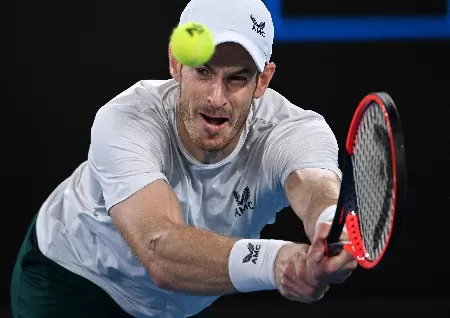Andy Murray's 4am Australian Open Finish Crazy Or Great Story

Is Andy Murray's Australian Open victory at 4 a.m. crazy or a great tale? The British player's longest match in a legendary career marked by comebacks both on and off the court lasted five hours and 45 minutes. When Andy Murray yelled during his spectacular five-set win at the Australian Open, he was expressing what many others were thinking: "Why are we playing at 3am?!" Even for the former world number one, who has a metal hip and has built a career out of spectacular comebacks, this was a bit much. At 4:05 a.m. on Friday in Melbourne, the extraordinary third-round victory of the three-time Grand Slam winner against Australian star Thanasi Kokkinakis came to an end. It was the longest match for a Briton in a tournament at five hours and 45 minutes
Thanasi Kokkinakis of Australia was defeated in the second round by three-time Grand Slam winner Rafael Nadal, whose illustrious career has been marked by comebacks both on and off the court.Murray must now get ready for a matchup with the 24th seed Roberto Bautista Agut on Saturday after also prevailing in a five-set match against the 13th seed Matteo Berrettini on Tuesday. Less than eight hours had passed when Murray returned to Melbourne Park for practise, but he made no attempt to conceal his disgust with what had transpired. The veteran, who was on the point of retiring four years ago in Melbourne before having career-saving hip surgery, remarked that rather than it being, like, a "epic Murray-Kokkinakis battle," it ended in a bit of a farce.
Murray, a young parent who has always been able to grasp the wider picture outside of tennis, claimed that it was advantageous to no one. He thanked the audience who continued to be there at Margaret Court Arena despite the possibility of day breaking. "Some individuals need to work the next day," he remarked. "My child would return home at five in the morning if they were a ball kid for a competition. I'm angry about it because I'm a parent." They don't benefit from it. The officials or the umpires do not benefit from it. For the fans, I don't think it's wonderful." It is detrimental to the players.
"Great story
The third-ranked American in the world, Jessica Pegula, said it hurt the players' bodies and minds.It's absurd. The 28-year-old, whose millionaire parents control the National Football League's Buffalo Bills, claimed that "no other sport does that." Because I don't believe any of the players believe it should be occurring at all, "I absolutely think it's something that has to be talked about." The Murray-Kokkinakis match is not the most recent conclusion in tennis' Open era. At the Australian Open that year, Lleyton Hewitt defeated Marcos Baghdatis in a third-round match that ended at 4:34 in the morning. It's not only there, either. Rafael Nadal defeated Novak Djokovic in a quarterfinal match at the French Open last year.
As part of a new broadcasting agreement, the French Open introduced night sessions in 2021, saving the day's marquee event for primetime viewers. Despite an avalanche of criticism from both inside and outside tennis, Australian Open administrator Craig Tiley stated on Friday that there was "no necessity" to change the Melbourne schedule. One advocate for having just one match during night sessions at Grand Slams was Jamie Murray, a doubles specialist who is also competing at Melbourne Park.
However, Tiley noted that "if you just schedule one game at night and there is an injury, you have nothing for viewers or broadcasters." Additionally, not all athletes object to playing so late. The game kicked off at 10:00 p.m. Kokkinakis extended it.Murray extended it as well "said Stefanos Tsitsipas, who holds the third-highest seed in the men's draw. "I believe that tennis like these kind of matches because they have a backstory; this match has a fantastic backstory and will go down in history.""I do recall the game that Baghdatis and Hewitt played with great clarity and detail. "I do recall this time," I think to myself. It's someplace back in my consciousness. Jannik Sinner, age 21, claimed he "didn't care" what time he played.
Related queries to this article
- Andy Murray
- Australian Open
- Australian Open 2023
- Thanasi Kokkinakis
- Rafael Nadal
- Roberto Bautista Agut
- Matteo Berrettini
- Jessica Pegula
- Lleyton Hewitt
- Marcos Baghdatis
- Novak Djokovic
- French Open
- Jamie Murray
- Stefanos Tsitsipas
- Jannik Sinner
Read more articles and stories on InstaSity Latest News.





